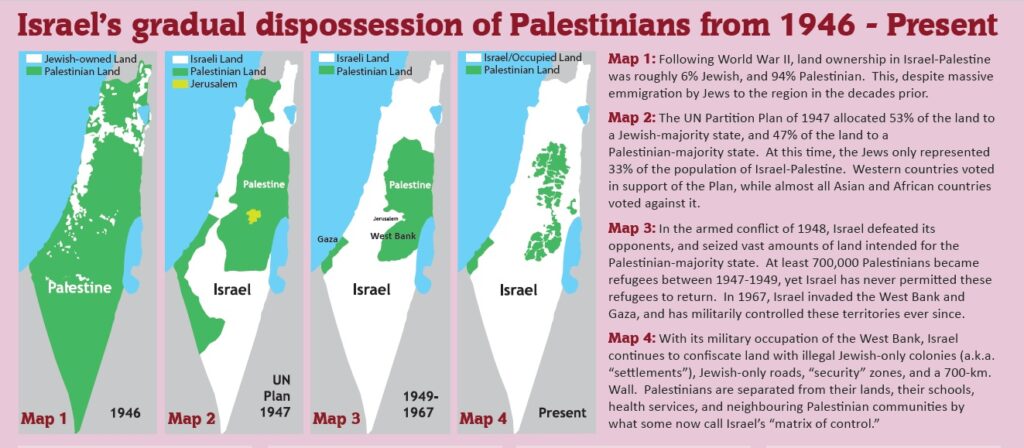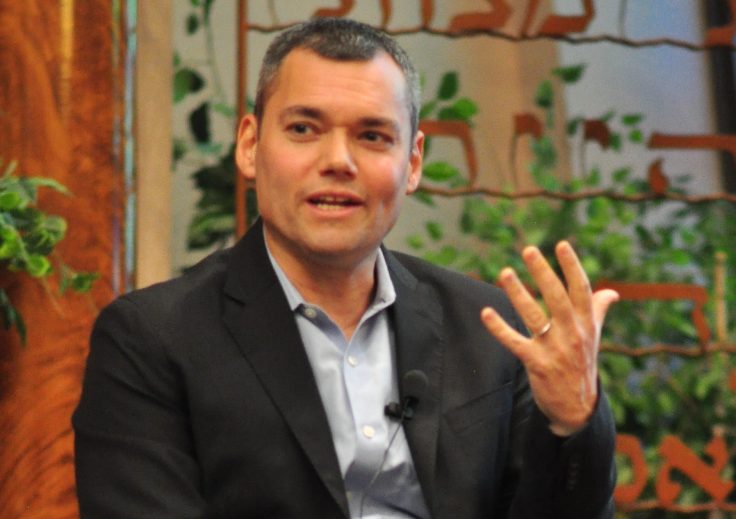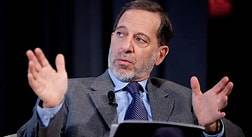Grim Prospects for Palestinian Reality of Self-Rule, Reputable American Scholars Assert

By: John Mason / Arab America Contributing Writer
Three prominent American scholars express their pessimism about an equitable solution to the situation of occupied Palestinians. First, Noam Chomsky suggests that neither of the two-state/one-state solutions is viable and suggests a third alternative, one of ‘Greater Israel,’ which explicitly leaves out Palestinian population concentrations. Peter Beinart suggests that under Prime Minister Benjamin Netanyahu, Israel will just continue its plan to annex chunks of the West Bank. Rashid Khalidi is also not optimistic about a just solution, suggesting a continuation of Israel’s policy of apartheid and, using the title of Khalidi’s book, its ‘Hundred Years’ War on Palestine.’
Master of all things Palestine and Israel–Noam Chomsky pessimistic about independent Palestine
Renowned US academic, Noam Chomsky, recently shared his sense of the possibility of Palestinian independence through a Q&A with Al-Jazeera. Chomsky was expansive in his sharing, based on decades of study and analysis of the Arab-Israel conundrum. First, he opined that the invasion of Iraq 20 years ago was the “worst crime of the century.” That is just one baseline of U.S. performance in the Middle East that Chomsky has formulated.
Al Jazeera noted in the Q&A that, following Netanyahu‘s election in 1996, Chomsky predicted that Netanyahu would “be more palatable for Americans.” However, he commented that in the meantime, Israeli politics had shifted and Netanyahu moved much further to the right. Chomsky said, “You have to remember, the opinion in the United States with regard to Israel has shifted. Israel used to be the darling of the liberal American Jewish.”

In a recent poll on American perceptions, Democrats expressed “more sympathy for Palestinians than for Israel.” This was especially so for younger Americans, including younger Jews. Having spent many years in the U.S., Netanyahu understands the culture. Thus, he is “appealing strongly to his constituency on the right wing and the far right.” He is not afraid of insulting Democrats, having embarrassed former president Obama in 2015 during a visit to the U.S. by avoiding him, then by embracing ex-president Trump in both of his runs.
Today, Chomsky asserts, the U.S. and Israel are increasingly split. He purports, “This is the first time Israeli leadership has openly broken with US leadership … when Smotrich and Ben-Gvir and sometimes Netanyahu say: ‘We’re just going to disregard what you want,’ openly and brazenly to American leadership, that’s new.”
While Obama resisted Israel’s requests, Trump “went all out to offer Israel anything it wanted, in love with Israeli power, violence, and repression. Recognized the Golan Heights annexation, Jerusalem annexation, and supported settlement policies all in violation not only of international law but of US policy. Trump reversed UN Security Council resolutions that banned the Israeli takeover of Golan Heights and of Jerusalem.”
Now Chomsky’s concern is with the Israeli Supreme Court. Netanyahu wants to give the legislature control of that body. It has been the one stabilizing force in protecting Palestinians’ rights. But in the main, the Court has mostly protected Jewish citizens of Israel, with less regard for Palestinians in Israel, and worse, for Palestinians in the occupied territories of the West Bank and Gaza.
Chomsky sees the two-state solution as implausible and now even the one-state alternative is out of the question
Chomsky suggests that the debate over the two-state/one-state solution has omitted a third alternative, “namely the one that is being systematically implemented by Israel, ever since 1969 or so, is the creation of a ‘Greater Israel’, which will take over. Everything that’s of value to Israel will leave out the Palestinian population concentrations.”
He feels ‘Greater Israel’ must “maintain a large Jewish majority in a racist, Jewish-dominated state.” This would mean a takeover of the Jordan Valley, removal of the local population, and taking over Jewish settlements. Such a takeover of towns deep in the West Bank would mean a community such as Maale Adumim—”built mostly in the 1990s, state-subsidized pleasant housing … You can go from your subsidized villa in Maaleh Adumim to your job in Tel Aviv and not even know there are any Palestinians.” The remaining Palestinians living in about 160 or so small enclaves would be imprisoned by Israeli forces. Whether such forces would allow Palestinians “to tend their crops, tend their livestock and pick their olives and so on” is almost certainly not feasible.

Basically, the idea is to just get rid of the Palestinians somehow or other, to get them to leave simply intolerable conditions. Longer-term outcomes of one state or two states ignore reality. Chomsky believes “… it’s almost inconceivable that Israel will ever agree to destroy itself and become a Jewish minority population in a Palestinian-dominated state, which is what the demography indicates.” His sense is the reality is heading towards the notion of a ‘Greater Israel’, with the vague possibility of some kind of two-state arrangement.
Even two states are improbable given the presence of “the enormous settlement project.” A riddled, swiss-cheese fragmentation of Palestinian communities scattered among Jewish settlements almost precludes any sense of a greater Palestinian community on the West Bank. Any sense of the UN Security Council debate in the 1970s over a resolution calling for the establishment of two states with each experiencing “peace and security within secure and recognized borders” is long gone. Israel was adamantly opposed. It still is today, 2023.
One liberal American Jewish perspective: “I No Longer Believe in a Jewish State”
Peter Beinart, an American Jewish professor/journalist with a strong familial link to Israel, averred, “Over decades I argued for separation between Israelis and Palestinians. Now, I can imagine a Jewish home in an equal state.” Many liberal American Jews concur with that opinion. As we saw in the earlier Chomsky piece, however, a single state comprised of Israeli Jews and a growing Palestinian population is anathema to many Israeli Jews.
A younger Beinart recalled a 1993 image of Yitzhak Rabin and Yasir Arafat shaking hands on the White House lawn “to officially begin the peace process that many hoped would create a Palestinian state alongside Israel. I’ve been arguing for a two-state solution — first in late-night bull sessions, then in articles and speeches — ever since.” Beinart’s family origins based on their moving all over Europe as part of the Jewish diaspora convinced him of the value of a single Jewish community. Following the Holocaust, that community became a reality not only as a Jewish community but as a Jewish state.

A two-state solution that would give Palestinians a country of their own was Beinart’s dream. That would allow him to “remain a liberal and a supporter of Jewish statehood at the same time.” Much later, that dream died. “Events have now extinguished that hope.”
Beinart now says, “About 640,000 Jewish settlers now live in East Jerusalem and the West Bank, and the Israeli and American governments have divested Palestinian statehood of any real meaning. The Trump administration’s peace plan envisions an archipelago of Palestinian towns, scattered across as little as 70% of the West Bank, under Israeli control. Even the leaders of Israel’s supposedly center-left parties don’t support a viable, sovereign Palestinian state.”
Tacitly agreeing with Chomsky, a much younger Beinart suggests, “If Prime Minister Benjamin Netanyahu fulfills his pledge to impose Israeli sovereignty in parts of the West Bank, he will just formalize a decades-old reality: In practice, Israel annexed the West Bank long ago.” This is Chomsky’s ‘Greater Israel’ construct. More explicitly, Beinart describes such an entity as: “one country that includes millions of Palestinians who lack basic rights.”
Beinart avers, on the goal of equal rights for Jews and Palestinians, “It’s time to imagine a Jewish home that is not a Jewish state.”
The two-state solution for Palestine is a distant dream according to one Arab American scholar
When U.S. Senators are asked to support Palestinian rights, it is usually camouflaged by the phrase, ‘the two-state solution.’ The Star-Banner newspaper, however, states the issue point blank: “Our politicians talk about two states even though Israel’s Prime Minister Benjamin Netanyahu has long spoken of ‘less than a state’ to describe his vision of a future for Palestinians who demand equal rights in their ancestral land.”
With Netanyahu threatening to scoop more and more of the Palestinian territory, which Israel has occupied militarily since 1967, the two-state myth is at the end of its rope. “The choice for Israel and for its U.S. supporters is now clear: an apartheid Jewish-supremacist nation with millions of Indigenous people denied self-determination, freedom of movement, equal justice and other basic human rights — or the alternative, two peoples with equal rights living together in one state.”

Columbia University professor Rashid Khalidi sees the war on Palestine as “a colonial war on the Indigenous population that has rationally resisted displacement by Zionist settlers for more than a century.” This is all spelled out in his recent book, The Hundred Years’ War on Palestine. Khalidi describes the occupation as a campaign of terror and ethnic cleansing in which the occupiers established a vibrant population in the form of Jewish settlements. But the new power could not rid itself of all of the indigenous people, much less provide for the welfare of the 750,000 Palestinians.
Khalidi describes the relationship of Israelis with occupied Palestinians as primarily one of colonialism. There are two peoples in Palestine, only one of whose national existence is recognized. Khalidi avers, “Their mutual acceptance can only be based on complete equality of rights, including national rights, notwithstanding the crucial historical difficulties between the two. There is no other possible sustainable solution, barring the unthinkable notion of one people’s extermination or expulsion by the other.”
A distant hope is the best we can infer from Khalidi’s book as concerns the plight of the Palestinians. While he sees the U.S. as the one player who could broker peace between Israel and the Palestinians, Khalidi is not optimistic. The alternatives are a U.S.-enabled “Israeli apartheid and the Hundred Years’ War on Palestine. Or will we help birth a true democracy based on equal rights? That is our choice.”
Sources:
–“Q&A: Noam Chomsky on Palestine, Israel and the state of the world,” Al-Jazeera 4/9/2023
–“I No Longer Believe in a Jewish State,” (Peter Beinart} New York Times, 7/8/2020
–“Admit it: The two-state solution for Palestine is dead,” Star Tribune, 8/7/2020
John Mason, PhD., who focuses on Arab culture, society, and history, is the author of LEFT-HANDED IN AN ISLAMIC WORLD: An Anthropologist’s Journey into the Middle East, New Academia Publishing, 2017. He has taught at the University of Libya, Benghazi, Rennselaer Polytechnic Institute in New York, and the American University in Cairo; John served with the United Nations in Tripoli, Libya, and consulted extensively on socioeconomic and political development for USAID and the World Bank in 65 countries.
Check out our Blog here!








